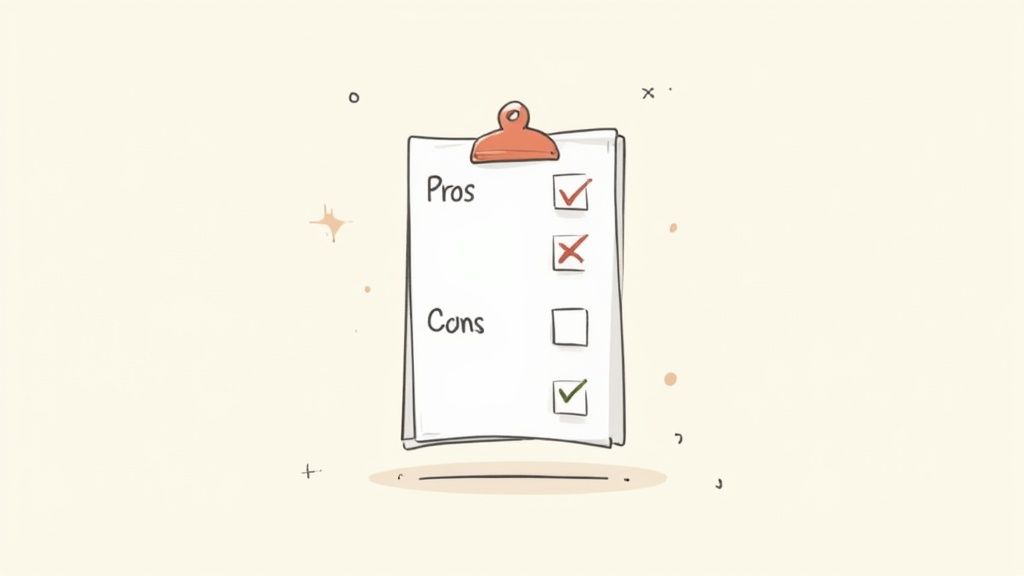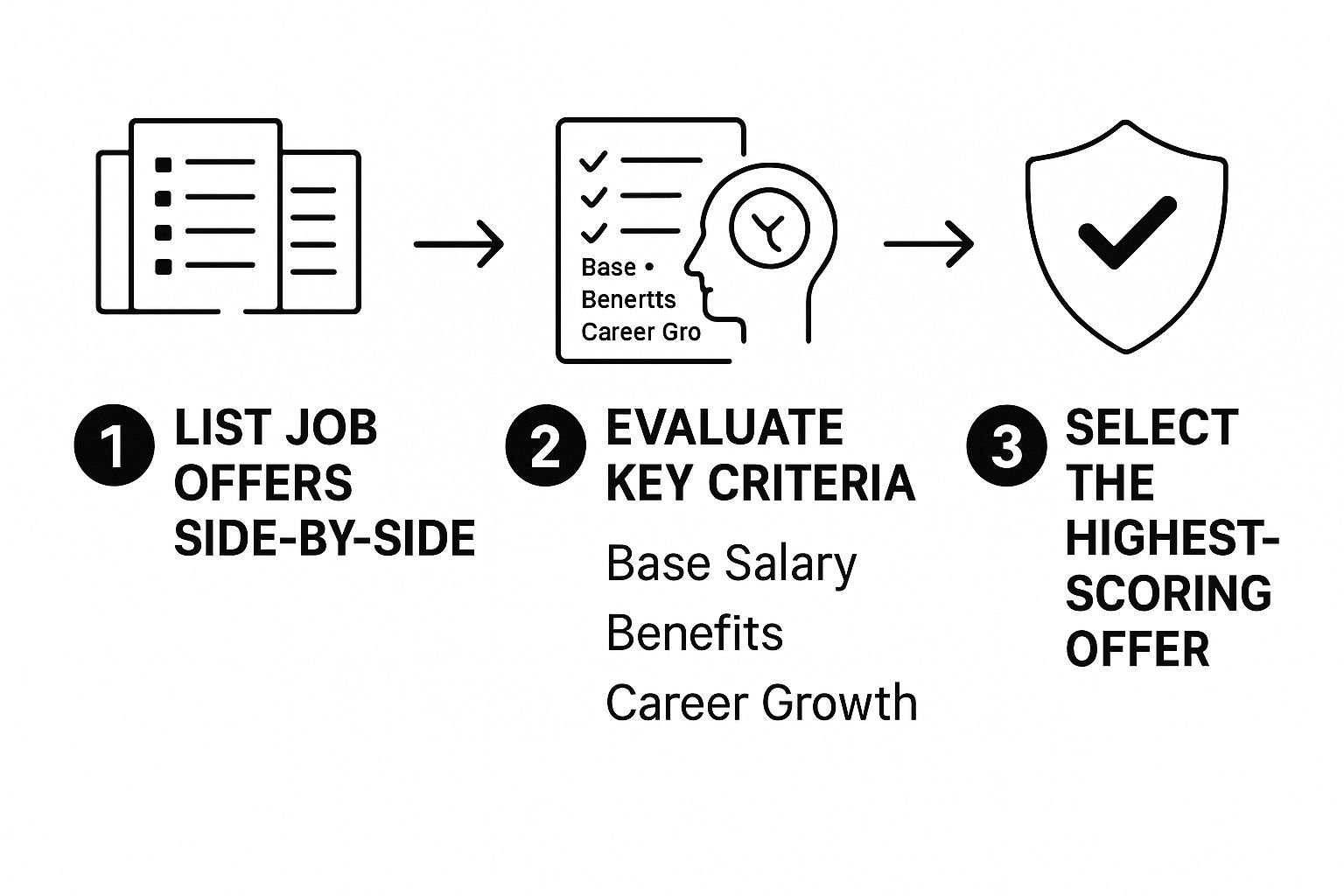How to Handle Multiple Job Offers and Choose Right

So, the offers are rolling in. More than one, in fact. First comes the adrenaline rush, then a wave of pressure. It’s a great problem to have, sure, but it's still a problem you have to solve, usually with the clock ticking.
The trick is to immediately reframe this from a stressful situation into a moment of genuine career power. This isn't just about picking a job; it's about deliberately choosing your next chapter.
The Best Problem to Have: Navigating Your Options
Let's be real—juggling multiple job offers can feel overwhelming once the initial excitement wears off. Instead of letting the pressure get to you, it's time to get organized and approach this like the strategic career move it is. You’re in the driver's seat.
Your first move, as soon as that second offer lands, is all about communication. Get in touch with the recruiter from the first company. Be polite, professional, and genuinely enthusiastic. Let them know you're still very interested, but explain that you’ve received another offer and need a little more time to make the right decision for your career.
A simple, respectful request for more time shows you're a serious professional. Frame it with confidence: "I'm incredibly excited about this opportunity and want to give it the thoughtful consideration it deserves. Would it be possible to have until [Date] to give you my final answer?" Most reasonable employers will appreciate the transparency.
Establish Your Framework
Next, you need to get everything out of your head and onto a screen. Seriously, don't try to keep all the details straight in your mind—it's a recipe for confusion. A simple spreadsheet is your best friend here.
Create columns for each company and start plugging in the details. This isn’t just about the money. This initial organization is your defense against making a rushed decision you'll regret later. It pulls the emotion out of the equation and lets you compare apples to apples.
While you're feeling on top of the world with these options, it's good to have some perspective. The job market has definitely gotten tougher. In the first quarter of 2025, only 44% of job seekers reported getting multiple offers. That's a huge drop from 72% back in early 2023.
And what are people looking for? While compensation is the top factor for 53% of candidates, things like career growth (47%) and work-life balance (45%) are right behind. This data, which you can read more about in this HR Dive article, really highlights why you need to look at the whole package. Being in this position is a rare advantage right now.
To help you get started immediately, here’s a quick-glance table for your first moves. Think of it as your game plan for the first 24 hours.
Immediate Action Plan for Multiple Offers
Following this simple plan right away turns chaos into control. It ensures you don't burn any bridges and gives you the space you need to make a choice you’ll be happy with for years to come.
Look Beyond the Salary to Find the Right Fit

The biggest number on an offer letter is always going to catch your eye. It's only natural. But I've seen too many people grab the highest salary only to find themselves in a miserable job, counting the minutes until they can leave. True career satisfaction is a cocktail of compensation, professional growth, and plain old daily happiness.
So, when you're weighing multiple offers, you have to shift your focus. Stop staring at the salary and start investigating the reality of what it would be like to work there every single day.
Think of it this way: you wouldn't buy a house based on price alone, right? Two homes might have the same price tag, but one could be hiding a cracked foundation while the other is ready for you to move in and has fantastic neighbors. The sticker price never tells the whole story, and neither does a base salary. You've got to look closer.
Uncover the Real Company Culture
Forget the ping-pong tables and free snacks for a moment. Real company culture is the invisible force in an office—it’s the shared attitudes, behaviors, and unwritten rules that dictate how people interact and get work done. A toxic culture will burn you out, no matter how much you're getting paid.
Go back through your interview experiences. What was the vibe? Did people seem genuinely collaborative and engaged, or was the office eerily quiet and tense? Those gut feelings are often your most reliable intel.
Here are some clues I always look for:
- How they talked about challenges: Did they frame problems as exciting team projects or did they start pointing fingers and blaming former employees? The latter is a huge red flag.
- The questions they asked you: Was it all about your hard skills and what you could produce, or did they seem genuinely curious about you as a person and how you'd fit into the team?
- Your potential manager's vibe: Did you get the sense they would be a supportive coach or a micromanager who would breathe down your neck? Trust your instincts here.
A seasoned recruiter once told me, "Interviewing goes both ways. Candidates are just as much interviewing us as we are interviewing them." Take that to heart. You're not just a candidate; you're an investigator gathering intelligence.
Gauge Your Growth Potential
A job offer isn't just about the role you're taking today; it's about the career you're building for tomorrow. Where can this job take you in one, three, or even five years? A slightly lower salary at a company with a reputation for promoting from within is often a much savvier long-term move than a high-paying, dead-end job.
Let's imagine a real-world scenario. Offer A is $90,000 at a massive, bureaucratic corporation where promotions are rare and take years. Offer B is $82,000 at a fast-growing startup that has a well-defined mentorship program and a clear path to a senior position in about 18 months. Offer A pays more now, but Offer B sets you up for the experience and advancement that could lead to a $120,000+ role much, much faster.
So, how do you figure this out?
- Ask Direct Questions: In your final talks, don't be shy. Ask, "What does a typical career path look like for someone in this position?"
- Look for Mentorship: Inquire about their approach to mentorship, whether it's a formal program or just part of the culture. A company that invests in its people is a place you can grow.
- Do Some LinkedIn Sleuthing: Look up people on LinkedIn who previously held the title you're being offered. Did they get promoted within the company, or did they have to jump ship to move up?
Your salary is obviously a critical piece of the puzzle, and you need to be ready to negotiate. For more specific tactics, our guide on how to answer salary expectations can help you position yourself for the best possible offer. Making a fully informed decision now is what truly sets you up for long-term success.
Comparing Total Compensation Packages
So, you’ve got multiple job offers on the table. The initial thrill is amazing, but once that settles, it’s time to get serious and look past those big, flashy salary numbers. I’ve seen it countless times: a higher base salary doesn't automatically mean you’re better off financially. The best offer is almost always hidden in the fine print.
Think of it this way. You're choosing between two cars. Car A has a lower price, but Car B gets better gas mileage, includes a full warranty, and comes with three years of free maintenance. Over the long haul, Car B is the smarter financial move. The exact same thinking applies here. You have to calculate the true value of each offer.
This is where you put on your financial detective hat. Your first move is to reach out to each company's HR department and politely request a detailed benefits summary. Just explain that you want to do a thorough comparison to make the best possible decision. In my experience, most companies are happy to provide this information.
This whole process can feel overwhelming, but breaking it down into clear stages makes it manageable.

When you lay everything out visually like this, you transform a confusing mess of details into a clear, data-driven choice.
Look Beyond the Obvious Numbers
Let's walk through a real-world scenario. Imagine Offer A comes in at $85,000, and Offer B is at $80,000. At first glance, Offer A seems like the clear winner, right? But let's dig a little deeper.
Offer A includes a high-deductible health plan that costs you $300 a month in premiums, plus a steep $5,000 deductible. Offer B, on the other hand, provides a much stronger plan with $100 monthly premiums and only a $1,000 deductible. Do the math. The healthcare difference alone is $6,400 per year. Suddenly, that "lower" $80,000 salary from Offer B starts looking a lot more appealing.
The goal isn't just comparing salaries; it's about comparing your potential net income and out-of-pocket costs. What really matters is how much money is left in your bank account after all the work-related expenses are paid.
To get a crystal-clear view, you absolutely need to put everything into a worksheet. It’s the only way to compare apples to apples and see the full financial picture. The simple table below is a great starting point.
Total Compensation Comparison Worksheet
Filling out a sheet like this forces you to consider every single dollar. Don't skip any of these items, because even small differences can add up to thousands of dollars over the year.
Key Financial Factors to Analyze
As you fill in your comparison sheet, pay close attention to these areas. They are often where the real value lies.
- Healthcare Costs: Look at the monthly premiums for medical, dental, and vision, but don't stop there. The deductibles and out-of-pocket maximums tell you how much financial risk you’re taking on.
- Retirement Match: This is free money. A company matching 100% on up to 6% of your salary is literally giving you a 6% raise. Never leave this on the table.
- Bonuses and Equity: Is that performance bonus a sure thing or just a possibility? What’s the vesting schedule for any stock options? A four-year vesting schedule is a golden handcuff—you have to stay that long to get the full value.
- Paid Time Off (PTO): How many vacation, sick, and personal days do you get? An extra week of vacation is a hugely valuable, non-taxable perk that directly impacts your work-life balance.
- Professional Development: Does the company offer a budget for courses, certifications, or conferences? This is a direct investment in you and your future earning power.
Taking the time to compare these factors gives you the power of clarity. This isn't just about picking a job; it’s about making a strategic decision that supports the life you want to build. For more on this, check out our guide on how to find a job you love, which connects these practical choices to long-term fulfillment.
The Art of Professional Negotiation

This is where the real magic happens. A solid offer is fantastic, but negotiation is how you shape it into the perfect career move. When you're juggling more than one offer, you're in an enviable position of strength. The trick is to play your cards with grace and professionalism.
Your goal isn't to spark a bidding war or pit companies against each other. It’s about having a transparent, respectful conversation that reinforces your value and keeps your relationships with every potential employer positive.
The best way to start? Know what you want. Before you even think about picking up the phone to negotiate, decide which job offer is truly your number one. This gives you a clear target and keeps you from getting tangled in endless back-and-forth discussions that go nowhere.
My advice? Always frame your negotiation as a partnership. Think of it as trying to close a small gap, not issuing a demand. Your tone should scream, "I am so excited about this opportunity, and I'd love to figure out how we can make this the perfect fit."
Kicking Off the Conversation
Once you’re ready to talk with your top-choice company, the key is to be direct without being aggressive. You don't need to lay out every single detail of the other offer. A simple, confident statement is all it takes.
You could try something like this:
"I am genuinely thrilled with this offer and can really see myself growing with your team. I want to be completely transparent—I do have another competitive offer on the table. Since this role is my absolute preference, I was hoping we could discuss the compensation package a bit more to make this an easy and immediate 'yes' for me."
This approach works because it hits three crucial points:
- It reinforces your genuine interest in their role.
- It introduces your leverage (the other offer) in a non-confrontational way.
- It invites a discussion, not a standoff.
It also helps to be aware of the bigger picture. With the global 'jobs gap' affecting over 400 million people, some companies are watching their budgets closely. But that same pressure means they are more determined than ever to lock down top talent who can bring real value. Your multiple offers prove you're in that top tier.
Looking Beyond the Base Salary
What if the company says their hands are tied on the salary? Don’t panic. This is your cue to get creative. Often, there’s a lot more flexibility in other parts of the compensation package.
Think about negotiating for other high-value perks that can dramatically improve your work-life balance and overall financial health.
Consider asking about things like:
- A one-time signing bonus to sweeten the deal.
- An extra week of paid vacation time each year.
- A dedicated professional development budget for certifications or courses.
- More generous work-from-home or flexible schedule options.
These items often come from different budgets than payroll, making them easier for a manager to approve. If you’re just starting your career, I know these conversations can feel intimidating. Our guide on entry-level salary negotiation is packed with scripts and confidence-building tips for exactly these situations.
Remember, the absolute worst-case scenario is they say no. Asking professionally and respectfully will almost never get an offer pulled.
Making Your Final Decision and Communicating It
After all the back-and-forth, the spreadsheets, and the negotiations, you've reached the final hurdle. It’s time to make the call. This is often the trickiest part of the whole process because it’s where hard data meets human intuition.
You can analyze numbers all day long, but sometimes the "best" offer on paper just doesn't feel right. Don't ignore that feeling. Your gut is a powerful tool, often picking up on subtle cues from your interviews—the team's vibe, the manager's communication style—that your rational mind might have overlooked. If one offer genuinely excites you and the other gives you a sinking feeling, that’s a major clue.
Trusting Your Gut and Making the Call
To help bridge the gap between logic and intuition, try creating one last, highly personal pros-and-cons list. Move beyond generic points and weigh each factor according to what really matters to you. Is that shorter commute actually more valuable than a slightly better 401(k) match? Does the promise of real mentorship outweigh the prestige of a well-known company?
Here’s a practical tip: Score each factor on your list from 1 to 10 based on its personal importance. This simple weighting exercise can cut through the noise and bring surprising clarity, revealing which opportunity truly aligns with your life, not just your career.
This is especially critical today. The reality is that by May 2025, an estimated 8.5 million Americans were holding down multiple jobs just to make ends meet. This trend, particularly among young adults and women, underscores how vital it is to think about an offer's potential for burnout. As you weigh your options, ask yourself: Will this job leave me with enough energy for the rest of my life, or will it push me toward exhaustion? For more context on this growing challenge, check out the insights on managing multiple work commitments on Careerminds.com.
The best career decision is one that supports your entire life, not just your bank account. Choose the opportunity that energizes you, not the one that will simply drain you for a bigger paycheck.
Communicating Your Decision with Professional Grace
How you handle this final communication says a lot about you. Your professional reputation is built on moments like these. The goal is to leave every company with a positive impression, whether you’re saying yes or no.
Accepting the OfferWhen you call or email to accept, let your excitement show! Reiterate why you’re thrilled to join the team and briefly confirm the key terms like your start date. Keep it professional, but don't be afraid to sound genuinely happy. You earned it.
Declining Other OffersThis conversation requires a bit more finesse. If you can, call the hiring manager directly—it’s a much more personal and respectful touch than an email.
Be polite, appreciative, and straight to the point. You don’t owe them a lengthy explanation. Something simple and professional works best:
“Thank you so much for your time and the generous offer. This was a very difficult decision, but I've decided to accept another position that I feel is a better fit for my career goals at this time.”
That's it. This approach is gracious and keeps the relationship intact, leaving the door open for the future. You never know when your paths might cross again.
Getting to the point of having multiple offers is a huge win, but it takes a lot of work. That’s why so many job seekers are turning to new methods to manage the application volume. If you're looking to create more opportunities for yourself, learning about tools for automating job applications can be a real advantage.
By handling your final communications with class, you cement your reputation as a thoughtful, top-tier professional.
Common Questions About Handling Multiple Job Offers

Even with a perfect game plan, juggling a few different job offers can get complicated. With deadlines looming and your emotions running high, it's completely normal to start second-guessing your every move. Let's walk through some of the stickiest situations that almost always come up during this final, high-stakes phase.
How you navigate these moments is critical. This isn't just about locking in your next job; it’s about protecting your professional reputation for years to come. Think of it as the final, and most important, exam of your entire job search.
How Transparent Should I Be About Other Offers?
This is where things get delicate. You absolutely should let your top-choice company know you have another offer on the table. It’s your single greatest point of leverage in any negotiation. But that doesn't mean you have to lay all your cards out.
I’ve found the best approach is to be confidently vague. A simple, "I'm weighing another competitive offer right now," is powerful. It does the job without revealing the company's name or the exact salary. This keeps you in the driver's seat and signals your market value without turning the conversation into an aggressive bidding war, which can sometimes backfire.
If they push for more details, you can politely stand your ground. Try saying something like, “Out of respect for their process, I'd prefer to keep the specifics confidential. What I can say is that this decision is about finding the right long-term home, and I’m hoping we can make it work because your company is where I want to be.”
What If an Employer Pressures Me for an Immediate Decision?
First, take a deep breath. An "exploding offer"—one with a crazy-short deadline—is a classic pressure tactic. A reasonable employer who genuinely wants to hire you will understand that this is a major life decision. They’ll respect a request for a bit more time.
Thank them for the offer with genuine enthusiasm, and then calmly state what you need. You could say, "I am incredibly excited about this opportunity. This is a big decision, and to make sure I give it the thoughtful consideration it deserves, would it be possible to have until Friday to give you my final answer?"
A company that won't budge on a reasonable request for a few extra days might be showing you a major red flag about its culture. It can be an early sign that they don’t respect employee well-being or healthy boundaries.
Can I Accept an Offer and Then Back Out?
Technically, you can. In most places, an offer letter isn't a legally binding contract. But—and this is a big but—it’s a move that can burn bridges to the ground. Reneging on an accepted offer can do serious damage to your professional reputation, not just with that company, but across your entire industry. Recruiters and hiring managers talk. It’s a small world.
The best practice is to never, ever accept an offer until you are 100% certain it's the one. Do all your thinking, comparing, and negotiating before you say yes. This keeps you out of the incredibly awkward and professionally risky position of having to go back on your word.
Getting to this final stage is a huge win, but it means you first had to master the application process itself. To boost your chances of getting multiple offers in the first place, you might want to look into the best way to apply for jobs using modern strategies that truly set you apart. By handling these final negotiations with confidence and grace, you ensure you start your new role on the best possible footing.
So, the offers are rolling in. More than one, in fact. First comes the adrenaline rush, then a wave of pressure. It’s a great problem to have, sure, but it's still a problem you have to solve, usually with the clock ticking.
The trick is to immediately reframe this from a stressful situation into a moment of genuine career power. This isn't just about picking a job; it's about deliberately choosing your next chapter.
The Best Problem to Have: Navigating Your Options
Let's be real—juggling multiple job offers can feel overwhelming once the initial excitement wears off. Instead of letting the pressure get to you, it's time to get organized and approach this like the strategic career move it is. You’re in the driver's seat.
Your first move, as soon as that second offer lands, is all about communication. Get in touch with the recruiter from the first company. Be polite, professional, and genuinely enthusiastic. Let them know you're still very interested, but explain that you’ve received another offer and need a little more time to make the right decision for your career.
A simple, respectful request for more time shows you're a serious professional. Frame it with confidence: "I'm incredibly excited about this opportunity and want to give it the thoughtful consideration it deserves. Would it be possible to have until [Date] to give you my final answer?" Most reasonable employers will appreciate the transparency.
Establish Your Framework
Next, you need to get everything out of your head and onto a screen. Seriously, don't try to keep all the details straight in your mind—it's a recipe for confusion. A simple spreadsheet is your best friend here.
Create columns for each company and start plugging in the details. This isn’t just about the money. This initial organization is your defense against making a rushed decision you'll regret later. It pulls the emotion out of the equation and lets you compare apples to apples.
While you're feeling on top of the world with these options, it's good to have some perspective. The job market has definitely gotten tougher. In the first quarter of 2025, only 44% of job seekers reported getting multiple offers. That's a huge drop from 72% back in early 2023.
And what are people looking for? While compensation is the top factor for 53% of candidates, things like career growth (47%) and work-life balance (45%) are right behind. This data, which you can read more about in this HR Dive article, really highlights why you need to look at the whole package. Being in this position is a rare advantage right now.
To help you get started immediately, here’s a quick-glance table for your first moves. Think of it as your game plan for the first 24 hours.
Immediate Action Plan for Multiple Offers
Following this simple plan right away turns chaos into control. It ensures you don't burn any bridges and gives you the space you need to make a choice you’ll be happy with for years to come.
Look Beyond the Salary to Find the Right Fit

The biggest number on an offer letter is always going to catch your eye. It's only natural. But I've seen too many people grab the highest salary only to find themselves in a miserable job, counting the minutes until they can leave. True career satisfaction is a cocktail of compensation, professional growth, and plain old daily happiness.
So, when you're weighing multiple offers, you have to shift your focus. Stop staring at the salary and start investigating the reality of what it would be like to work there every single day.
Think of it this way: you wouldn't buy a house based on price alone, right? Two homes might have the same price tag, but one could be hiding a cracked foundation while the other is ready for you to move in and has fantastic neighbors. The sticker price never tells the whole story, and neither does a base salary. You've got to look closer.
Uncover the Real Company Culture
Forget the ping-pong tables and free snacks for a moment. Real company culture is the invisible force in an office—it’s the shared attitudes, behaviors, and unwritten rules that dictate how people interact and get work done. A toxic culture will burn you out, no matter how much you're getting paid.
Go back through your interview experiences. What was the vibe? Did people seem genuinely collaborative and engaged, or was the office eerily quiet and tense? Those gut feelings are often your most reliable intel.
Here are some clues I always look for:
- How they talked about challenges: Did they frame problems as exciting team projects or did they start pointing fingers and blaming former employees? The latter is a huge red flag.
- The questions they asked you: Was it all about your hard skills and what you could produce, or did they seem genuinely curious about you as a person and how you'd fit into the team?
- Your potential manager's vibe: Did you get the sense they would be a supportive coach or a micromanager who would breathe down your neck? Trust your instincts here.
A seasoned recruiter once told me, "Interviewing goes both ways. Candidates are just as much interviewing us as we are interviewing them." Take that to heart. You're not just a candidate; you're an investigator gathering intelligence.
Gauge Your Growth Potential
A job offer isn't just about the role you're taking today; it's about the career you're building for tomorrow. Where can this job take you in one, three, or even five years? A slightly lower salary at a company with a reputation for promoting from within is often a much savvier long-term move than a high-paying, dead-end job.
Let's imagine a real-world scenario. Offer A is $90,000 at a massive, bureaucratic corporation where promotions are rare and take years. Offer B is $82,000 at a fast-growing startup that has a well-defined mentorship program and a clear path to a senior position in about 18 months. Offer A pays more now, but Offer B sets you up for the experience and advancement that could lead to a $120,000+ role much, much faster.
So, how do you figure this out?
- Ask Direct Questions: In your final talks, don't be shy. Ask, "What does a typical career path look like for someone in this position?"
- Look for Mentorship: Inquire about their approach to mentorship, whether it's a formal program or just part of the culture. A company that invests in its people is a place you can grow.
- Do Some LinkedIn Sleuthing: Look up people on LinkedIn who previously held the title you're being offered. Did they get promoted within the company, or did they have to jump ship to move up?
Your salary is obviously a critical piece of the puzzle, and you need to be ready to negotiate. For more specific tactics, our guide on how to answer salary expectations can help you position yourself for the best possible offer. Making a fully informed decision now is what truly sets you up for long-term success.
Comparing Total Compensation Packages
So, you’ve got multiple job offers on the table. The initial thrill is amazing, but once that settles, it’s time to get serious and look past those big, flashy salary numbers. I’ve seen it countless times: a higher base salary doesn't automatically mean you’re better off financially. The best offer is almost always hidden in the fine print.
Think of it this way. You're choosing between two cars. Car A has a lower price, but Car B gets better gas mileage, includes a full warranty, and comes with three years of free maintenance. Over the long haul, Car B is the smarter financial move. The exact same thinking applies here. You have to calculate the true value of each offer.
This is where you put on your financial detective hat. Your first move is to reach out to each company's HR department and politely request a detailed benefits summary. Just explain that you want to do a thorough comparison to make the best possible decision. In my experience, most companies are happy to provide this information.
This whole process can feel overwhelming, but breaking it down into clear stages makes it manageable.

When you lay everything out visually like this, you transform a confusing mess of details into a clear, data-driven choice.
Look Beyond the Obvious Numbers
Let's walk through a real-world scenario. Imagine Offer A comes in at $85,000, and Offer B is at $80,000. At first glance, Offer A seems like the clear winner, right? But let's dig a little deeper.
Offer A includes a high-deductible health plan that costs you $300 a month in premiums, plus a steep $5,000 deductible. Offer B, on the other hand, provides a much stronger plan with $100 monthly premiums and only a $1,000 deductible. Do the math. The healthcare difference alone is $6,400 per year. Suddenly, that "lower" $80,000 salary from Offer B starts looking a lot more appealing.
The goal isn't just comparing salaries; it's about comparing your potential net income and out-of-pocket costs. What really matters is how much money is left in your bank account after all the work-related expenses are paid.
To get a crystal-clear view, you absolutely need to put everything into a worksheet. It’s the only way to compare apples to apples and see the full financial picture. The simple table below is a great starting point.
Total Compensation Comparison Worksheet
Filling out a sheet like this forces you to consider every single dollar. Don't skip any of these items, because even small differences can add up to thousands of dollars over the year.
Key Financial Factors to Analyze
As you fill in your comparison sheet, pay close attention to these areas. They are often where the real value lies.
- Healthcare Costs: Look at the monthly premiums for medical, dental, and vision, but don't stop there. The deductibles and out-of-pocket maximums tell you how much financial risk you’re taking on.
- Retirement Match: This is free money. A company matching 100% on up to 6% of your salary is literally giving you a 6% raise. Never leave this on the table.
- Bonuses and Equity: Is that performance bonus a sure thing or just a possibility? What’s the vesting schedule for any stock options? A four-year vesting schedule is a golden handcuff—you have to stay that long to get the full value.
- Paid Time Off (PTO): How many vacation, sick, and personal days do you get? An extra week of vacation is a hugely valuable, non-taxable perk that directly impacts your work-life balance.
- Professional Development: Does the company offer a budget for courses, certifications, or conferences? This is a direct investment in you and your future earning power.
Taking the time to compare these factors gives you the power of clarity. This isn't just about picking a job; it’s about making a strategic decision that supports the life you want to build. For more on this, check out our guide on how to find a job you love, which connects these practical choices to long-term fulfillment.
The Art of Professional Negotiation

This is where the real magic happens. A solid offer is fantastic, but negotiation is how you shape it into the perfect career move. When you're juggling more than one offer, you're in an enviable position of strength. The trick is to play your cards with grace and professionalism.
Your goal isn't to spark a bidding war or pit companies against each other. It’s about having a transparent, respectful conversation that reinforces your value and keeps your relationships with every potential employer positive.
The best way to start? Know what you want. Before you even think about picking up the phone to negotiate, decide which job offer is truly your number one. This gives you a clear target and keeps you from getting tangled in endless back-and-forth discussions that go nowhere.
My advice? Always frame your negotiation as a partnership. Think of it as trying to close a small gap, not issuing a demand. Your tone should scream, "I am so excited about this opportunity, and I'd love to figure out how we can make this the perfect fit."
Kicking Off the Conversation
Once you’re ready to talk with your top-choice company, the key is to be direct without being aggressive. You don't need to lay out every single detail of the other offer. A simple, confident statement is all it takes.
You could try something like this:
"I am genuinely thrilled with this offer and can really see myself growing with your team. I want to be completely transparent—I do have another competitive offer on the table. Since this role is my absolute preference, I was hoping we could discuss the compensation package a bit more to make this an easy and immediate 'yes' for me."
This approach works because it hits three crucial points:
- It reinforces your genuine interest in their role.
- It introduces your leverage (the other offer) in a non-confrontational way.
- It invites a discussion, not a standoff.
It also helps to be aware of the bigger picture. With the global 'jobs gap' affecting over 400 million people, some companies are watching their budgets closely. But that same pressure means they are more determined than ever to lock down top talent who can bring real value. Your multiple offers prove you're in that top tier.
Looking Beyond the Base Salary
What if the company says their hands are tied on the salary? Don’t panic. This is your cue to get creative. Often, there’s a lot more flexibility in other parts of the compensation package.
Think about negotiating for other high-value perks that can dramatically improve your work-life balance and overall financial health.
Consider asking about things like:
- A one-time signing bonus to sweeten the deal.
- An extra week of paid vacation time each year.
- A dedicated professional development budget for certifications or courses.
- More generous work-from-home or flexible schedule options.
These items often come from different budgets than payroll, making them easier for a manager to approve. If you’re just starting your career, I know these conversations can feel intimidating. Our guide on entry-level salary negotiation is packed with scripts and confidence-building tips for exactly these situations.
Remember, the absolute worst-case scenario is they say no. Asking professionally and respectfully will almost never get an offer pulled.
Making Your Final Decision and Communicating It
After all the back-and-forth, the spreadsheets, and the negotiations, you've reached the final hurdle. It’s time to make the call. This is often the trickiest part of the whole process because it’s where hard data meets human intuition.
You can analyze numbers all day long, but sometimes the "best" offer on paper just doesn't feel right. Don't ignore that feeling. Your gut is a powerful tool, often picking up on subtle cues from your interviews—the team's vibe, the manager's communication style—that your rational mind might have overlooked. If one offer genuinely excites you and the other gives you a sinking feeling, that’s a major clue.
Trusting Your Gut and Making the Call
To help bridge the gap between logic and intuition, try creating one last, highly personal pros-and-cons list. Move beyond generic points and weigh each factor according to what really matters to you. Is that shorter commute actually more valuable than a slightly better 401(k) match? Does the promise of real mentorship outweigh the prestige of a well-known company?
Here’s a practical tip: Score each factor on your list from 1 to 10 based on its personal importance. This simple weighting exercise can cut through the noise and bring surprising clarity, revealing which opportunity truly aligns with your life, not just your career.
This is especially critical today. The reality is that by May 2025, an estimated 8.5 million Americans were holding down multiple jobs just to make ends meet. This trend, particularly among young adults and women, underscores how vital it is to think about an offer's potential for burnout. As you weigh your options, ask yourself: Will this job leave me with enough energy for the rest of my life, or will it push me toward exhaustion? For more context on this growing challenge, check out the insights on managing multiple work commitments on Careerminds.com.
The best career decision is one that supports your entire life, not just your bank account. Choose the opportunity that energizes you, not the one that will simply drain you for a bigger paycheck.
Communicating Your Decision with Professional Grace
How you handle this final communication says a lot about you. Your professional reputation is built on moments like these. The goal is to leave every company with a positive impression, whether you’re saying yes or no.
Accepting the OfferWhen you call or email to accept, let your excitement show! Reiterate why you’re thrilled to join the team and briefly confirm the key terms like your start date. Keep it professional, but don't be afraid to sound genuinely happy. You earned it.
Declining Other OffersThis conversation requires a bit more finesse. If you can, call the hiring manager directly—it’s a much more personal and respectful touch than an email.
Be polite, appreciative, and straight to the point. You don’t owe them a lengthy explanation. Something simple and professional works best:
“Thank you so much for your time and the generous offer. This was a very difficult decision, but I've decided to accept another position that I feel is a better fit for my career goals at this time.”
That's it. This approach is gracious and keeps the relationship intact, leaving the door open for the future. You never know when your paths might cross again.
Getting to the point of having multiple offers is a huge win, but it takes a lot of work. That’s why so many job seekers are turning to new methods to manage the application volume. If you're looking to create more opportunities for yourself, learning about tools for automating job applications can be a real advantage.
By handling your final communications with class, you cement your reputation as a thoughtful, top-tier professional.
Common Questions About Handling Multiple Job Offers

Even with a perfect game plan, juggling a few different job offers can get complicated. With deadlines looming and your emotions running high, it's completely normal to start second-guessing your every move. Let's walk through some of the stickiest situations that almost always come up during this final, high-stakes phase.
How you navigate these moments is critical. This isn't just about locking in your next job; it’s about protecting your professional reputation for years to come. Think of it as the final, and most important, exam of your entire job search.
How Transparent Should I Be About Other Offers?
This is where things get delicate. You absolutely should let your top-choice company know you have another offer on the table. It’s your single greatest point of leverage in any negotiation. But that doesn't mean you have to lay all your cards out.
I’ve found the best approach is to be confidently vague. A simple, "I'm weighing another competitive offer right now," is powerful. It does the job without revealing the company's name or the exact salary. This keeps you in the driver's seat and signals your market value without turning the conversation into an aggressive bidding war, which can sometimes backfire.
If they push for more details, you can politely stand your ground. Try saying something like, “Out of respect for their process, I'd prefer to keep the specifics confidential. What I can say is that this decision is about finding the right long-term home, and I’m hoping we can make it work because your company is where I want to be.”
What If an Employer Pressures Me for an Immediate Decision?
First, take a deep breath. An "exploding offer"—one with a crazy-short deadline—is a classic pressure tactic. A reasonable employer who genuinely wants to hire you will understand that this is a major life decision. They’ll respect a request for a bit more time.
Thank them for the offer with genuine enthusiasm, and then calmly state what you need. You could say, "I am incredibly excited about this opportunity. This is a big decision, and to make sure I give it the thoughtful consideration it deserves, would it be possible to have until Friday to give you my final answer?"
A company that won't budge on a reasonable request for a few extra days might be showing you a major red flag about its culture. It can be an early sign that they don’t respect employee well-being or healthy boundaries.
Can I Accept an Offer and Then Back Out?
Technically, you can. In most places, an offer letter isn't a legally binding contract. But—and this is a big but—it’s a move that can burn bridges to the ground. Reneging on an accepted offer can do serious damage to your professional reputation, not just with that company, but across your entire industry. Recruiters and hiring managers talk. It’s a small world.
The best practice is to never, ever accept an offer until you are 100% certain it's the one. Do all your thinking, comparing, and negotiating before you say yes. This keeps you out of the incredibly awkward and professionally risky position of having to go back on your word.
Getting to this final stage is a huge win, but it means you first had to master the application process itself. To boost your chances of getting multiple offers in the first place, you might want to look into the best way to apply for jobs using modern strategies that truly set you apart. By handling these final negotiations with confidence and grace, you ensure you start your new role on the best possible footing.
Don't miss out on
your next opportunity.
Create and send applications in seconds, not hours.








